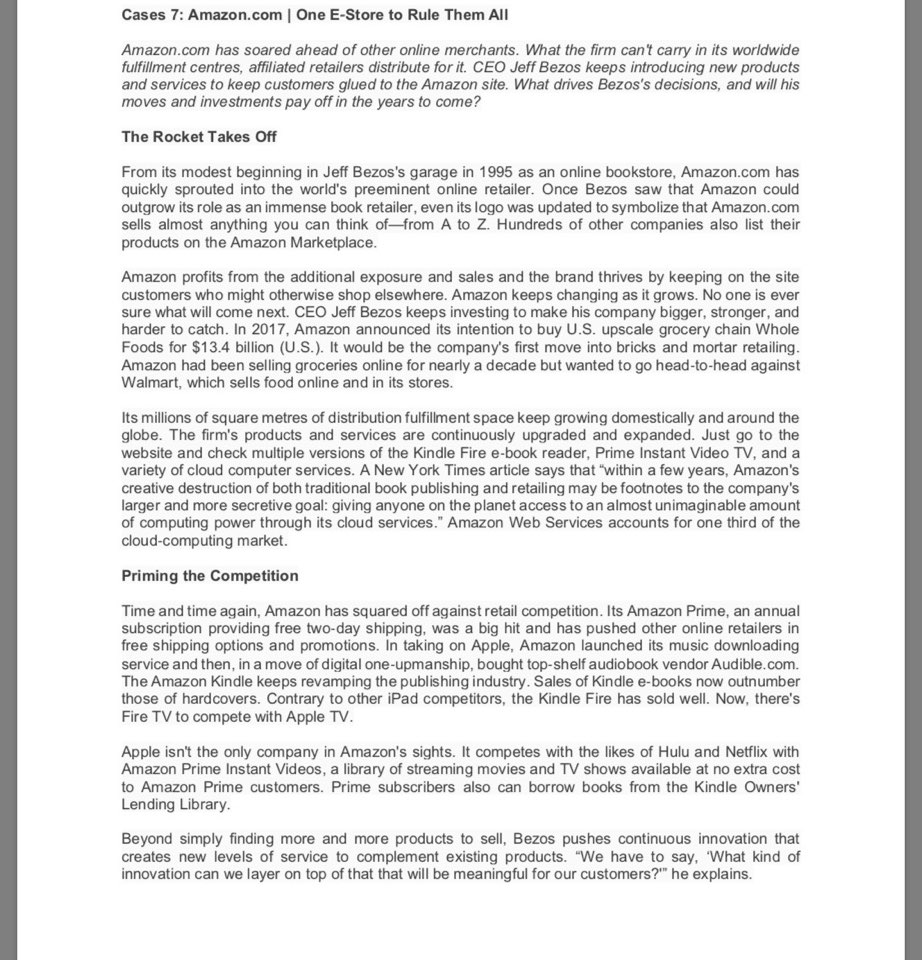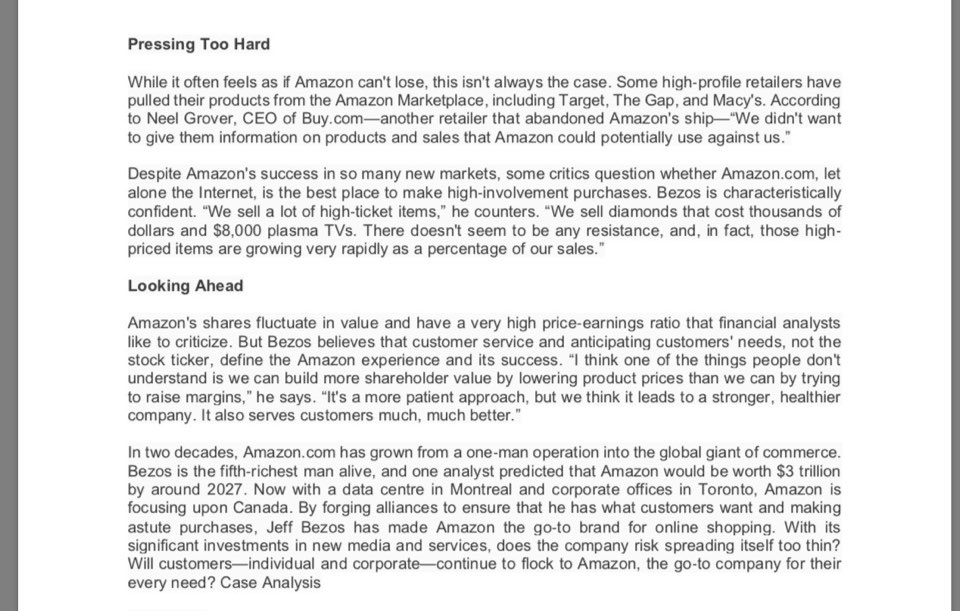1. In what ways does CEO Jeff Bezos's decisions to develop and deliver the Kindle, Kindle Fire, and Fire TV lines show systematic and intuitive thinking?
Amazon's CEO Jeff Bezos showed intuitive and systematic thinking by developing and delivering the Kindle, Kindle Fire, and Fire TV line that he constantly upgraded and expanded it with an imaginative way and few decision precedents. Amazon Prime which is an annual subscription program providing free two-day shipping service is a describing well on this. The service was unprecedented and caused a huge stir in the market place for their Amazon Prime members, they had made a great success in the online market place and many other online retailers began to offer similar shopping delivery services and options to their customers. Besides, Amazon revamped and innovated their products step by step to provide better service to their Amazon Prime members, especially people who use their Kindle services and Fire TV line. Amazon renovated their products consistently to access their variety of cloud computer services and convert their service to provide their streaming video service which is Amazon Prime Instant Video with no extra charge to their members.
2. How do you describe the competitive risk in Amazon's environment as other retailers, including Walmart and Apple, strengthen their online offerings?
Walmart which is global grocery chain company focused on selling grocery products on its store, while Amazon focused on selling the products on its online store for almost ten years. As the market place and the tread are changed, Walmart started to sell their groceries on their online website. To square off against Walmart's change, Amazon decided to take over Whole Foods which is upscale grocery chain company. Furthermore, Amazon released the music downloading service, took over the audiobook vendor which is Audible.com and revamped their existing products such as Kindle Fire to fight against Apple Music and iPad.
C
Cases 7: Amazon.com | One E-Store to Rule Them All Amazon.com has soared ahead of other online merchants. What the firm can't carry in its worldwide fulfillment centres, affiliated retailers distribute for it. CEO Jeff Bezos keeps introducing new products and services to keep customers glued to the Amazon site. What drives Bezos's decisions, and will his moves and investments pay off in the years to come? The Rocket Takes Off From its modest beginning in Jeff Bezos's garage in 1995 as an online bookstore, Amazon.com has quickly sprouted into the world's preeminent online retailer. Once Bezos saw that Amazon could outgrow its role as an immense book retailer, even its logo was updated to symbolize that Amazon.com sells almost anything you can think of-from A to Z. Hundreds of other companies also list their products on the Amazon Marketplace. Amazon profits from the additional exposure and sales and the brand thrives by keeping on the site customers who might otherwise shop elsewhere. Amazon keeps changing as it grows. No one is ever sure what will come next. CEO Jeff Bezos keeps investing to make his company bigger, stronger, and harder to catch. In 2017, Amazon announced its intention to buy U.S. upscale grocery chain Whole Foods for $13.4 billion (U.S.). It would be the company's first move into bricks and mortar retailing. Amazon had been selling groceries online for nearly a decade but wanted to go head-to-head against Walmart, which sells food online and in its stores. Its millions of square metres of distribution fulfillment space keep growing domestically and around the globe. The firm's products and services are continuously upgraded and expanded. Just go to the website and check multiple versions of the Kindle Fire e-book reader, Prime Instant Video TV, and a variety of cloud computer services. A New York Times article says that "within a few years, Amazon's creative destruction of both traditional book publishing and retailing may be footnotes to the company's larger and more secretive goal: giving anyone on the planet access to an almost unimaginable amount of computing power through its cloud services." Amazon Web Services accounts for one third of the cloud-computing market. Priming the Competition Time and time again, Amazon has squared off against retail competition. Its Amazon Prime, an annual subscription providing free two-day shipping, was a big hit and has pushed other online retailers in free shipping options and promotions. In taking on Apple, Amazon launched its music downloading service and then, in a move of digital one-upmanship, bought top-shelf audiobook vendor Audible.com. The Amazon Kindle keeps revamping the publishing industry. Sales of Kindle e-books now outnumber those of hardcovers. Contrary to other iPad competitors, the Kindle Fire has sold well. Now, there's Fire TV to compete with Apple TV. Apple isn't the only company in Amazon's sights. It competes with the likes of Hulu and Netflix with Amazon Prime Instant Videos, a library of streaming movies and TV shows available at no extra cost to Amazon Prime customers. Prime subscribers also can borrow books from the Kindle Owners' Lending Library. Beyond simply finding more and more products to sell, Bezos pushes continuous innovation that creates new levels of service to complement existing products. "We have to say, "What kind of innovation can we layer on top of that that will be meaningful for our customers?" he explains.Pressing Too Hard While it otten feels as 5 Amazon can't iose, this isn't always the case. Some high-prole retailers have pulled their productsfrom the Amazon Markelplace. including Target. The Gap. and Macy's. According to Neel Grover. CEO at Buy.comanother retailer that abandoned Amazon's ship--"We didn't want to give them information on products and sales that Amazon could potentially use against us.\" Despite Amazon's success in so many new markets. some critics question whether Amazoncom. let alone the Internet. is the best place to make high-involvement purchases. Bezos is characteristically confident. \"We sell a lot of high-ticket items.\" he counters. \"We sell diamonds that cost thousands of dollars and $8,000 plasma TVs. There doesn't seem to be any resistance, and. h fact. those high- prlced items are growing very rapidly as a percentage of our sales.\" Looking Ahead Amazon's shares fluctuate In value and have a very high price-earnings ratio that nancial analysts like to criticize. But Bezos believes that customer service and anticipating customers' needs. not the stock ticker. define the Amazon experience and Its success. \"I think one of the things people don't understand is we can build more shareholder value by lowering product prices than we can by trying to raise margins.\" he says. \"It's a more patient approach. but we think it leads to a stronger. healthier company. it also serves customers much, much better.' In two decades. Amazon.com has grown from a one-man operation into the global giant of commerce. Bezos is the fifth-richest man alive. and one analyst predicted that Amazon would be worth $3 trillion by around 2027. Now with a data centre in Montreal and corporate ofces in Toronto. Amazon is focusing upon Canada. By forging alliances to ensure that he has what customers want and making astute purchases. Jeff Bezos has made Amazon the gods brand for online shopping. With its significant investments in new media and services. does the company risk spreading Itself too thin? Will customersindividual and corporatecontinue to ock to Amazon. the 90-110 company for their every need? Case Anatysis








